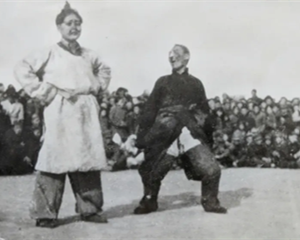In Reflections on Exile, Edward Said writes: "Exile is irremediably secular and unbearably historical … like death but without death's ultimate mercy, it has torn millions of people from the nourishment of tradition, family, and geography." I had not been forced to be in exile, but in the US, I too was torn from the nourishment of tradition, family and geography. To make up for this, I desperately longed to fill in the gaps of my knowledge about Asia.
在《流亡的反思》中,爱德华·赛义德写道:“流亡是不可挽回的世俗和无法忍受的历史……就像死亡,但没有死亡的终极仁慈,它撕裂了数百万人的传统、家庭和地理的滋养。”我没有被迫流亡,但在美国,我也失去了传统、家庭和地理的滋养。为了弥补这一点,我非常渴望填补我对亚洲的知识空白。
I loved hearing stories about China. Whenever I learned about Chinese history in school, I would go home and ask my parents. "No, that's not how it was, this is how it was," they would say. In contrast to what my textbooks said, my parents shared happy stories of the Cultural Revolution – of friends made on the farms, about the brilliance and charisma of my oldest aunt who had a posse of young admirers, about how the Chinese Communist party rewarded my nainaiyeye with medals and pensions for their military service. During my summer vacations, my cousins joked that my yeye paid for my dinners with his wallet from the CCP. And whenever I went back to Hefei, it was to a family that told me this was where I came from, where I would always be welcome and would always have a place.
我喜欢听有关中国的故事。每当我在学校学习中国历史,我都会回家问我的父母。“不,事情不是这样的,事情就是这样的,”他们会说。和我的课本上讲的不同,我的父母分享了文化大革命时期的快乐故事——在农场里结交的朋友,有关我那有一群年轻崇拜者的最年长的阿姨的才华和魅力,有关中国共产党如何用奖章和养老金奖励我的爷爷奶奶。在我暑假期间,我的堂兄弟们开玩笑说爷爷用他在共产党的钱包付了我的饭钱。每当我回到合肥,总会有一个家庭告诉我这就是我的家乡,在这里我将永远受到欢迎,这个家永远都在。

In December 2018, a year and a half before my grandparents passed away, I went to China to collect my family's oral histories. Like many children of immigrants, I had an uneasy feeling of being born out of formlessness, occupying an invisible space in a country that never filled in where exactly I was supposed to fit. I wanted to articulate my family's past, make sense of where we had come from, where I had come from. This was a duty I felt all the more responsible for because of my role in the family as the "writer".
2018年12月,也就是我祖父母去世的前一年半,我去中国收集了我的家族口述史。像许多移民的孩子一样,我有一种不自在的感觉,觉得自己出生时是无形的,在一个国家里占据着一个看不见的空间,而我应该在的地方从来没有被填满。我想要阐明我的家族的过去,弄清楚我们来自哪里,我来自哪里。因为我在家里的角色是“作家”,所以我觉得这是我更应该去承担的责任。
But for a long time I delayed making the trip – because it would be time-consuming, because it would be emotionally exhausting, because my Chinese was not good enough, because I did not know the right questions to ask. Yet my grandparents were getting older and older, and China changed more rapidly by the day. Finally, I knew I couldn't keep putting it off. I bought my ticket and went.
但在很长一段时间里,我推迟了这一行程计划——因为它会很耗时,因为它会让我精疲力竭,因为我的中文不够好,因为我不知道该问什么问题。但是,我的祖父母年纪越来越大,中国的变化也越来越快。最后,我知道自己不能再拖延了,于是我买了票就出发了。











